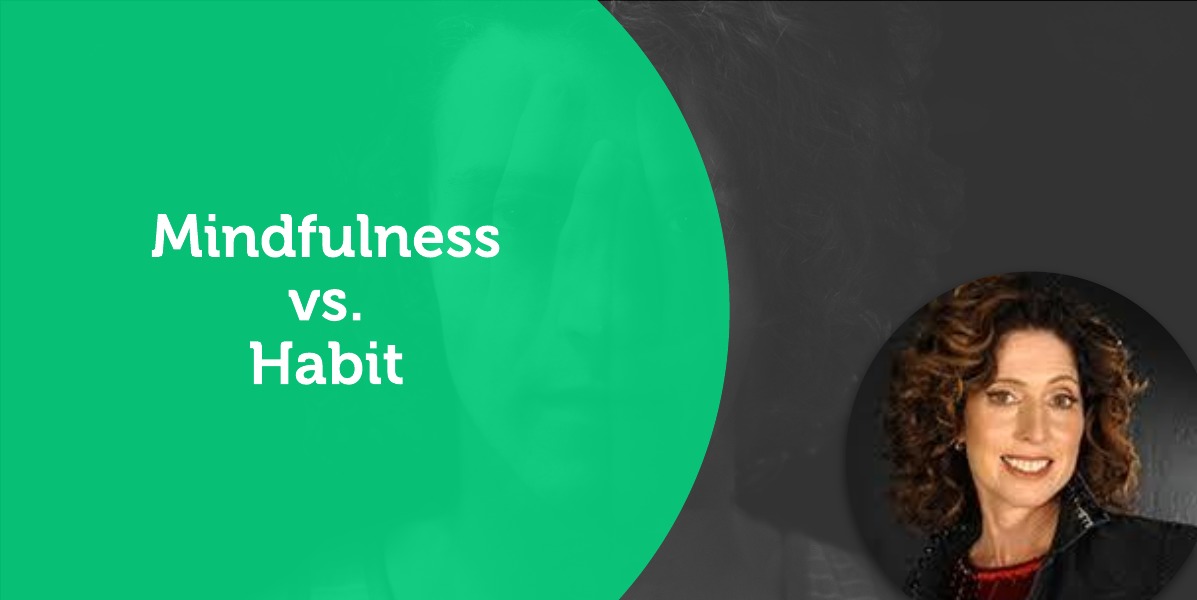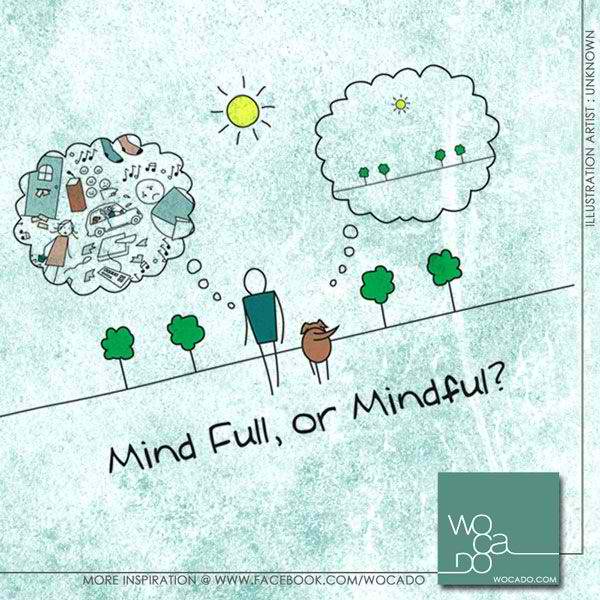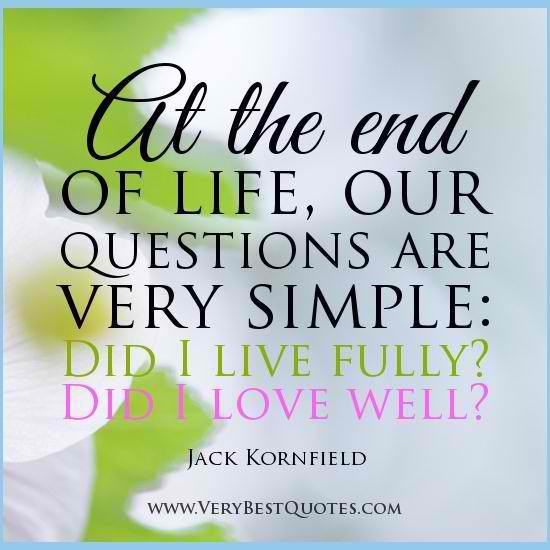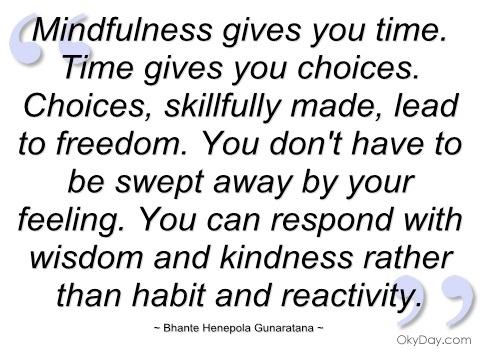
A Coaching Power Tool Created by Gayle Nobel
(Life Coach, UNITED STATES)
 mindfulness |ˈmīndfəәlnəәs|
mindfulness |ˈmīndfəәlnəәs|
noun
- the quality or state of being conscious or aware of something
- a mental state achieved by focusing one’s awareness on the present moment, while calmly acknowledging and accepting one’s feelings, thoughts, and bodily sensations, used as a therapeutic technique. habit |ˈhabit|
noun
- a settled or regular tendency or practise, esp. one that is hard to give up
- Psychology: an automatic reaction to a specific situation.
Mindfulness is about awareness. Awareness is about mindfulness. The life coaching conversation is about creating change and creating change requires awareness. Creating change asks us to step out of our habitual comfort zones and dive into new and sometimes uncomfortable territory. Mindfulness requires paying attention.
Mindfulness means we notice, pause, act, or think with slowed down and present moment awareness. We step away from past and future thinking and become fully immersed at this moment.
Mindfulness is a beautiful thing. It adds richness to our lives and is very powerful. However, the value of the habit is not to be negated for the sake of mindfulness. Habit serves us well and even enables mindfulness to flourish. It can help keep our minds less cluttered by performing more routine and mundane tasks on auto-pilot. The issue becomes when our habitual ways of being and responding keep us stuck or unaware. The mind’s habit of repeatedly leading us away from the present moment is an obstacle to mindfulness.
Mindfulness
The practise of mindfulness requires a pause. It is the pause in the action and/or thinking that has the power to remind us to think about how we want to respond, act, think, or be. This pause has the power to shove us out of the deep rut of habit and into the uncharted present moment. For one moment, we choose to stop and simply be.
In Wherever You Go, There You Are, author Jon Kabat-Zinn tells us that mindfulness is about
examining who we are, questioning our view of the world and our place in it, and cultivating some appreciation for the fullness of each moment we are alive. Most of all, it is about being in touch.
Kabat Zinn defines mindfulness as
paying attention in a particular way: on purpose, in the present moment, and non judgmentally.
According to Kabat-Zinn,
This kind of attention nurtures greater awareness, clarity, and acceptance of present-moment reality. It wakes us up to the fact that our lives unfold only in moments. If we are not fully present for many of those moments, we may not only miss what is most valuable in our lives, but also fail to realize the richness and the depth of our possibilities for growth and transformation. Our habits, our unconscious and automatic actions and behaviors are often driven by deep seated fears and insecurities. These end to build over time if they are not attended to and can eventually leave us feeling stuck and out of touch. Over time, we may lose confidence in our ability to redirect our energies in ways that would lead to great satisfaction and happiness, perhaps even to greater health.
Kabat-Zinn reminds us that
Mindfulness provides a simple but powerful route for getting ourselves unstuck, back into touch with out own wisdom and vitality. It is a way to take charge of the direction and quality of our own lives. The key to this path is an appreciation for the present moment and the cultivation of an intimate relationship with it though a continual attending to it with care and discernment. It is the direct opposite of taking life for granted.
Sounds a lot like life coaching, doesn’t it? Indirectly and directly, a life coach supports clients in creating more mindfulness in their lives.
Habit
Habit tends to get a bad rap. People associate the “H-word” with drugs, smoking, alcohol, and unhealthy eating. But habit is so much more. Habit can be defined as a subconscious, automatic behaviour or thought pattern. Anything we do or say or think automatically and repeatedly, without conscious thought, is considered a habit.
According to Martin Grunburg, author of The Habit Factor,
Humans are, by nature, creatures of habit. It’s widely reported that up to 95 percent of our thoughts and 45 percent of our behaviors are based on habit. If you think about it, most of our daily activities are a product of habit: when and how we get up in the morning, the way we shower, brush our teeth, get dressed, read the paper, eat, drive to work … the course of each day is directed by literally hundreds of our habits. The reality is, the habits we possess – or fail to possess – wield significant influence over us and go far deeper than just our daily routines. Our habits affect every aspect of our lives and have a ripple effect that impacts not just us but our friends and family. Ultimately, habits shape our destiny.
Imagine life without our habits. What if nothing came automatically? This would mean we would have to consciously think about all the tasks we do each day to maintain ourselves and to function at even the most basic level. I’m visualizing a mighty long to-do list. Everything from a walk to the bathroom, turn on the light and pick up the toothbrush. Or an array of coloured post-it notes adorning the walls. There would be little mental energy left over for the creative process or for learning new things. Getting through the day might be downright paralyzing and exhausting.
Clients often come to a life coach seeking habit change. At some point in the process, they become aware that their habits are not in alignment with their goals, intentions, and values. Their habits may be keeping them from moving forward, feeling fulfilled, living a healthy lifestyle or achieving their dreams. They have chosen to partner with a life coach because they’ve decided it’s time to move forward and create healthy habits and/ or eliminate unhealthy ones.
Most of us struggle with the notion that we have a wagon full of habits of thought and action which do not serve us. We may keep spotlighting the nagging habits which hold us back from living the life we want to live or being the person we want to be. We may judge ourselves harshly for this accumulation and for our struggle with habit change. We may forget to notice, acknowledge, and appreciate the habits that serve us well, make us happy and have been the key to our successes.
Dr Gail Brenner, the psychologist, reminds us that
habits can’t sustain themselves in the light of conscious awareness. They thrive on resistance and evasion. But when we illuminate them with laser-like attention, when we are willing to see things exactly as they are, they soften. The momentum begins to slow, and we become aware of space for new perspectives and choices. We realize freedom.
This is a very powerful perspective. With courage and commitment, we can change habits that affect every aspect of our lives with a ripple effect that impacts the people in our lives and in the big picture, our destiny.
According to Charles Duhigg, author of The Power of Habit,
Habits are powerful, but delicate. They can emerge outside our consciousness, or can be deliberately designed. They often occur without our permission, but can be reshaped by fiddling with their parts. They shape our lives far more than we realize — they are so strong, in fact, that they cause our brains to cling to them at the exclusion of all else, including common sense.
Habits are the stepping stones to achieving goals. They turn goals and dreams into reality. Habits are also the killers of our spirits and ultimately, of our physical bodies. Habits like to rule. The good news is, with increased awareness, we can sit in the driver’s seat, take the wheel, and control the car.
It’s not what we do once in a while that shapes our lives. It’s what we do consistently. ~Tony Robbins
 Personal Story
Personal Story
During a coaching session, I decided I wanted to focus more on “Living Fully”. In exploring what that looks like, I realized the amount of time spent on and distracted by my cell phone was not in alignment with my vision of “Living Fully”. The default behaviour of being on my phone multiple times throughout the day had become a habit.
I committed to limiting my cell phone use to necessary calls and texts for one week. The first thing I had to do was become more mindful around my phone vs my typical habitual or mindless activity with it.
Initially, mindfulness was definitely not a habit. I decided to create a four-part strategy. Step one was to pay attention and just notice when I had the urge or itch to use my cell phone. Step two was to pause and take a couple of deep breaths. Step three was to distract my mind by thinking of one thing I was grateful for. Step four was to focus my attention on the present moment by choosing to spend a few moments noticing and “being” in my surroundings. Mindful rather than a mind full.
It wasn’t long before I had my first opportunity to practice mindfulness. I was at physical therapy for my foot and bored on the exercise bike. Suddenly, I had the urge, the itch. I wanted to pick up my cell phone and begin scanning email. The habit was so strong, I almost did it without thinking but then my commitment to mindfulness kicked in. I noticed I paused, I breathed. Ahhh, the beauty of mindfulness. I remembered what I had committed to and got in touch with gratitude. And finally, I spent a few moments being present to where I was, paying attention to how I felt and my surroundings. The cell phone urge passed and I was able to appreciate the simplicity of being where I was without needing to do anything else.
The mind loves to fall back into automatic pilot, habitual modes of unawareness. Mindfulness is a challenge as lapses in awareness is often triggered by dissatisfaction with what we are seeing or feeling in the moment leading to a desire for something to be different than it is. With mindfulness, we wake up, pay attention, and capture moments.
Upon reflection, the most enjoyable and memorable moments in life are usually the ones in which we are completely present. Unfortunately, we spend a lot of our time doing one thing and thinking of things we aren’t doing. The problem is most of us are extremely habituated to living in our thoughts. The remembered past and the imagined future steal our attention most of the time. We have a habit of being mentally absent from the present moment much of the time. It’s when we’re present that we see beauty, enjoy gratitude, and experience happiness. It’s the moments we’re present for that make life good.
Habit can be both an enemy and a friend to mindfulness. Mindfulness in itself is a beautiful and powerful habit to cultivate. And mindfulness can be a powerful tool for habit change. Harnessing the power of habit to create more mindfulness in life is positive and powerful. It is in a space of mindfulness from which awareness and commitment to change can bloom. With mindfulness, we are able to shine the light on the habits that do and do not serve us as well as the direction we wish to head.
Becoming more mindful is a life long journey which can be both challenging and rewarding. Committing to moments of mindfulness can lead to greater ease, gratitude, happiness and fulfilment. What a powerful way to love yourself and your life.
 Self Application
Self Application
- What are the habits you have that serve you or fill you with energy?
- What are the habits you have that do not serve you or drain you of energy?
- Reacting is often very habitual. Responding is often more mindful. Where in your life do you tend to react vs respond? Where in your life to you tend to respond vs react?
- Where would you like to be less reactive and more responsive?
- What are the moments during your day when you are fully present, noticing and enjoying the moment?
- Where in your life would you like to create more moments of mindfulness?
Coaching Application
- Model mindfulness by offering breathing and visualization exercises to support the client in discovering the power of the present moment.
- Slow down. Make room for silence as part of the coaching dance.
- Acknowledge moments of mindful self-awareness in clients.
- Support clients in uncovering habits of thought and action which do not serve them.
- Support clients in creating habits of thought and action that serve them.
- Invite and challenge clients, when appropriate, to practice mindfulness by pausing throughout their days to notice their breath without trying to change it.
Baby steps are a powerful tool for habit change. When practised regularly, just one or two small actions can create a powerful shift in mindfulness. Invite and challenge clients to choose a small action they do daily like opening a door or sitting in a chair and do it mindfully.
